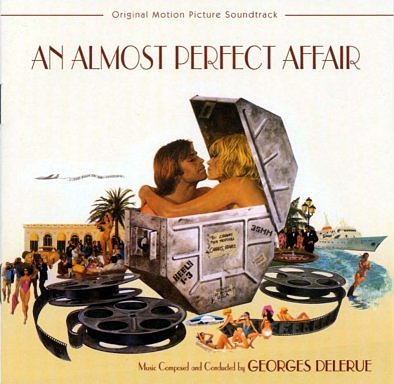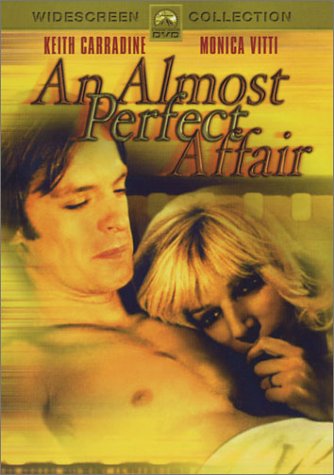From the July 1985 Video Times. — J.R.
An Almost Perfect Affair
(1979), C, Director: Michael Ritchie. With Keith Carradine, Monica Vitti, Raf Vallone, and Dick Anthony Williams. 93 min. PG. Paramount, $59.95. 1 1/2 stars
The seventh and possibly the slightest of Michael Ritchie’s features, An Almost Perfect Affair is a mild romantic comedy that qualifies as pseudosatire — that is, satire that couldn’t conceivably threaten or annoy anyone. Set at the Cannes Film Festival, and largely filmed on location there, the movie chronicles a brief affair between Maria (Monica Vitti) and Hal (Keith Carrdine). Maria is the glamorous wife of a wealthy Italian producer (Raf Vallone), who has a film in the competition. Hal is a callow American independent whose first feature is being shown at the festival. None of this is very believable to anyone who has ever attended the Cannes Festival professionally, but there’s little indication that it’s supposed to be. Much as Manhattan can be viewed in part as valentine to anti-intellectuals who want to feel intellectual, this movie, also made in 1979, is for people who will never go to Cannes but want to feel hip about what happens there.
Inverting the terms that such a comedy would have adopted in the countercultural 1960s, the movie presents the vulgar big-time producer as a man with patriarchal dignity. Hall, on the other hand, is treated as a silly but harmless politico: Introducing his film to a small, apathetic audience, he calls it “a cross between cinéma vérité and film noir.” The unmistakable villain of the piece, playing Mephistopheles to Hal’s innocent Faust, is black filmmaker Andrew Jackson (Dick Anthony Williams), a cynical hustler-promoter who quickly assumes the role of Hal’s agent. The only character treated with more contempt is jackson’s black girlfriend, shown to be even more of an opportunist. Director Ritchie is careful to give her large breasts lots of attention. “I seen it once, I seen it a hundred times,” Jackson remarks to Hal at one climactic juncture. “Pussy comes in the door, art goes out the window.” It’s a line that can serve fairly well as the film’s epigraph — or epitaph.
Taking advantage of the occasion, the film offers brief cameo appearances by Rona Barrett, Farrah Fawcett-Majors, Brooke Shields, Orson Welles, and anybody else who was lounging around the Hotel Carlton at the time. But if anyone justifies the film’s existence, it’s Vitti. She brings an expressive, creative flair to her cliché-ridden part. Carradine has more trouble transcending a set of boorish Ugly Americanisms that the movie assigns his character in order to show how cute and resourceful he is — such as calling France “a nation of schmucks,” insulting a wine steward, and stealing a bicycle. It’s hard to do much of anything in a movie predicated on the supposed charm of colonialist arrogance and the innate corruption of the powerless.
— JONATHAN ROSENBAUM


